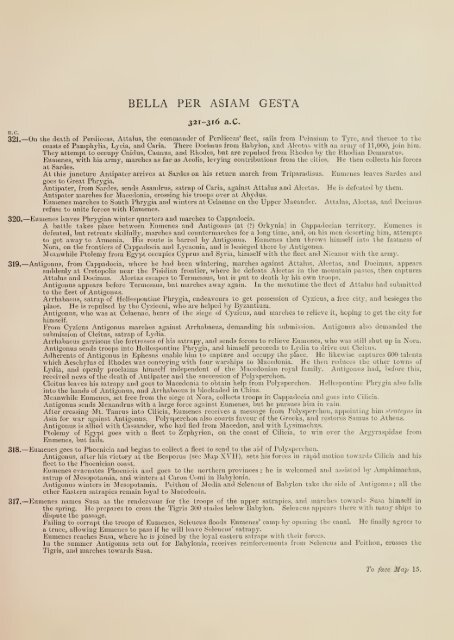Download this file - TwileShare
Download this file - TwileShare
Download this file - TwileShare
Create successful ePaper yourself
Turn your PDF publications into a flip-book with our unique Google optimized e-Paper software.
BELLA PER ASIAM GESTA<br />
321-316 a.C.<br />
B.C.<br />
321.—^On the death of Perdiceas, Attalus, the commander of Perdiccas' fleet, sails from Pelusium to Tyre, and thence to the<br />
coasts of Pamphj'lia, Lycia, and Caria. There Docimus from Babylon, and Alcetah with an army of 11,000, join him.<br />
They attempt to occupy Cnidus, Cauiius, and Rhodes, but are repulsed from Rhodes by the Rhodian Demaratus.<br />
Eumenes, with his army, marches as far as Aeolis, levying contributions from the cities. He then collects his forces<br />
at Sardes.<br />
At <strong>this</strong> juncture Antipater arrives at Sardes on his return march from Triparadisus. Eumenes leaves Sardes and<br />
goes to Great Phrygia.<br />
Antipater, from Sardes, sends Asandrus, satrap of Caria, against Attains and Alcetas. He is defeated by them.<br />
Antipater marches for Macedonia, crossing his troops over at Abydus.<br />
Eumenes marches to South Phrygia and winters at Celaenae on the Upper Maeander. Attalus, Alcetas, and Docimus<br />
refuse to unite forces with Eumenes.<br />
320.—Eumenes leaves Phrygian winter quarters and marches to Cappadocia.<br />
A battle takes place between Eumenes and Antigonus (at (?) Orkynia) in Cappadocian territory. Eumenes is<br />
defeated, but retreats skilfully, marches and countermarches for a long time, and, on his men deserting him, attempts<br />
to get away to Armenia. His route is barred by Antigonus. Eumenes then throws himself into the fastness of<br />
Nora, on the frontiers of Cappadocia and Lycaonia, and is besieged there by Antigonus.<br />
Meanwhile Ptolemy from Egypt occupies Cyprus and Syria, himself with the fleet and Nioanor with the army.<br />
319.—Antigonus, from Cappadocia, where he had been wintering, marches against Attalus, Alcetas, and Docimus, appears<br />
suddenly at Cretopolis near the I'isidian frontier, where he defeats Alcetas in the mountain passes, then captures<br />
Attalus and Docimus. Alcetas escapes to Termessus, but is put to death by his own troops.<br />
Antigonus appears before Termessus, but marches away again. In the meantime the fleet of Attalus had submitted<br />
to the fleet of Antigonus.<br />
Arrhabaeus, satrap of Hellespontine Phrygia, endeavours to get possession of Cyzicus, a free citj', and besieges the<br />
place. He is repulsed by the Cyziceni, who are helped by Byzantium.<br />
Antigonus, who was at Celaenae, hears of the siege of Cyzicus, and marches to relieve it, hoping to get the city for<br />
himself.<br />
From Cyzicus Antigonus marches against Arrhabaeus, demanding his submission. Antigonus also demanded the<br />
submission of Cleitus, satrap of Lydia.<br />
Arrhabaeus garrisons the fortresses of his satrapy, and sends forces to relieve Eumenes, who was still shut up in Nora.<br />
Antigonus sends troops into Hellespontine Phrygia, and himself proceeds to Lydia to drive out Cleitus.<br />
Adherents of Antigonus in Ephesus enable him to capture and occupy the place. He likewise captures 600 talents<br />
which Aeschylus of Rhodes was conveying with four warships to Macedonia. He then reduces the other towns of<br />
Jjydia, and openly proclaims himself independent of the Macedonian royal family. Antigonus had, before <strong>this</strong>,<br />
received news of the death of Antipater and the succession of Polysperchon.<br />
Cleitus leaves his satrapy and goes to Macedonia to obtain help from Polysperchon. Hellespontine Phrygia also falls<br />
into the hands of Antigonus, and Arrhabaeus is blockaded in Chius.<br />
Meanwhile Eumenes, set free from the siege at Nora, collects troops in Cappadocia and goes into Cilicia.<br />
Antigonus sends Menandrus with a large force against Eumenes, but he pursues him in vain.<br />
After crossing Mt. Taurus into Cilicia, Eumenes receives a message from Polysperchon, appointing him xlrategii^ in<br />
Asia for war against Antigonus. Polysperchon also courts favour of the Greeks, and restores Samus to Athens.<br />
Antigonus is allied with Cassander, who had fled from Macedon, and with Lysimachus.<br />
Ptolemy of Egypt goes with a fleet to Zephyrion, on the coast of Cilicia, to win over the ArgjTaspidae from<br />
Eumenes, but fails.<br />
318.— Eumenes goes to Phoenicia and begins to collect a fleet to send to the aid of Poli'sperchon.<br />
Antigonus, after his victory at the Bosporus (see Map XVII), sets his forces in rapid motion towards Cilicia and his<br />
fleet to the Phoenician coast.<br />
Eumenes evacuates Phoenicia and goes to the northern provinces ; he is welcomed and assisted by Amphimachus,<br />
satrap of Mesopotamia, and winters at Caron Comi in Babylonia.<br />
Antigonus winters in Mesopotamia. Peithon of Media and Seleucus of Babylon take the side of Antigonus ; all the<br />
other Eastern satrapies remain loyal to Macedonia.<br />
317. — Eumenes names Susa as the rendezvous for the troops of the upper satrapies, and marches towards Susa himself in<br />
the spring. He prepares to cross the Tigris 300 stades below Babylon. Seleucus appears there with many ships to<br />
dispute the passage.<br />
Failing to corrupt the troops of Eumenes, Seleucus floods Eumenes' camp b}' opening the canal. He finally agrees to<br />
a truce, allowing Eumenes to pass if he will leave Seleucus' satrapy.<br />
Eumenes reaches Susa, where he is joined by the loyal eastern satraps with their forces.<br />
In the summer Antigonus sets out for Babylonia, receives reinforcements from Seleucus and Peithon, crosses the<br />
Tigris, and marches towards Susa.<br />
To face Map 15.
















